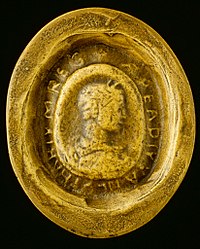Lothair II: Difference between revisions
Units/dates/other |
m robot Adding: pt:Lotário II da Lotaríngia |
||
| Line 84: | Line 84: | ||
[[ja:ロタール2世]] |
[[ja:ロタール2世]] |
||
[[pl:Lotar II]] |
[[pl:Lotar II]] |
||
[[pt:Lotário II da Lotaríngia]] |
|||
[[ru:Лотарь II (король Лотарингии)]] |
[[ru:Лотарь II (король Лотарингии)]] |
||
[[sr:Лотар II (краљ Лотарингије)]] |
[[sr:Лотар II (краљ Лотарингије)]] |
||
Revision as of 05:26, 9 October 2008
| Lothair II | |
|---|---|
| King of Lotharingia | |
 Seal of Lothair II | |
| Reign | 855-869 |
| Predecessor | Emperor Lothair I as King of Middle Francia |
| Heir | Lands divided between Louis the German and Charles the Bald |
| Consort | Teutberga |
| Issue | Hugh, Duke of Alsace, Gisela of Frisia, Bertha |
| House | Carolingian Dynasty |
| Father | Emperor Lothair I |
| Mother | Ermengarde of Tours |
Template:Carolingians, Lotharingia and Italy Lothair II (835 - August 8, 869), was the second son of Emperor Lothair I and Ermengarde of Tours. He was married to Teutberga, daughter of Boso the Elder
Upon his father's death in 855, he received as his kingdom a territory west of the Rhine stretching from the North Sea to the Jura mountains. It became known as Regnum Lotharii and early in the 10th century as Lotharingia or Lorraine (a designation subsequently applied only to the duchy of Lorraine). His elder brother Louis II received northern Italy and the title of Emperor, and his younger brother Charles received the western parts of his father's domains, Burgundy and the Provence.
On the death of his brother Charles in 863, Lothair added some lands south of the Jura to this realm, but except for a few feeble expeditions against the Norman pirates he seems to have done little for its government or its defense.
Lothair's reign was chiefly occupied by his efforts to obtain a divorce from his wife Theutberga, a sister of Hucbert, abbot of St Maurice (d. 864) and daughter of the Bosonid Boso the Elder, and his relations with his uncles Charles the Bald and Louis the German were influenced by his desire to obtain their support for this endeavor. Although quarrels and reconciliations between the three kings followed each other in quick succession, in general it may be said that Louis favoured the divorce, and Charles opposed it, while neither lost sight of the fact that Lothair had no sons to inherit his lands. Lothair, whose desire for the divorce was prompted by his affection for his mistress, Waldrada, put away Theutberga, but Hucbert took up arms on her behalf, and after she had submitted successfully to the ordeal of water, Lothair was compelled to restore her in 858. Still pursuing his purpose, he won the support of his brother, Emperor Louis II, by a cession of lands and obtained the consent of the local clergy to the divorce and to his marriage with Waldrada, which took place in 862.
A synod of Frankish bishops met at Metz in 863 and confirmed this decision, but Teutberga fled to the court of Charles the Bald, and Pope Nicholas I voided the decision of the synod. An attack on Rome by the emperor was without result, and in 865 Lothair, threatened with excommunication and convinced that Louis and Charles at their recent meeting had discussed the partition of his kingdom, again took back his wife. Teutberga, however, either from inclination or compulsion, now expressed her desire for a divorce, and Lothair went to Italy to obtain the assent of the new pope, Adrian II. Placing a favourable interpretation upon the words of the pope, he had set out on the return journey, when he was seized with fever and died at Piacenza on the August 8, 869. He left, by Waldrada, a son Hugo who was declared illegitimate, and his kingdom was divided between his uncles Charles the Bald and Louis the German by the Treaty of Mersen.
Illegitimate children
- Hugh (c.855-895), Duke of Alsace
- Gisela (865-908), married Godfrey, Duke of Frisia
- Bertha (c.863-925), married Theobald of Arles, brother of Theutberga, and then Adalbert II of Tuscany
- Ermengard
References
- Hincmar, "Opusculum de divortio Lotharii regis et Tetbergae reginae," in Cursus completus patrologiae, tome cxxv., edited by J. P. Migne (Paris, 1857-1879)
- M. Sdralek, Hinkmars von Rheims Kanonistisches Gutachten uber die Ehescheidung des Königs Lothar II (Freiburg, 1881)
- E. Dummler, Geschichte des ostfränkischen Reiches (Leipzig, 1887-1888)
- E. Muhlbacher, Die Regenten des Kaiserreichs unter den Karolingern (Innsbruck, 1881)
- This article incorporates text from a publication now in the public domain: Chisholm, Hugh, ed. (1911). Encyclopædia Britannica (11th ed.). Cambridge University Press.
{{cite encyclopedia}}: Missing or empty|title=(help)
